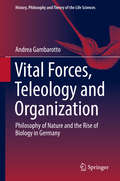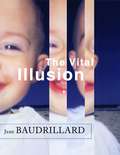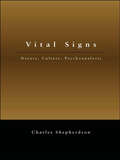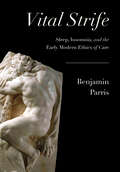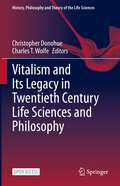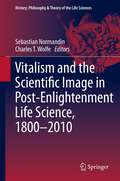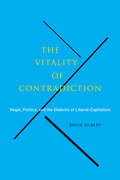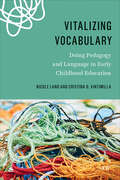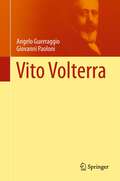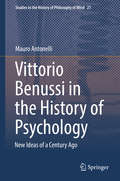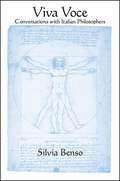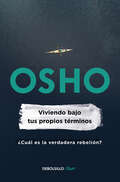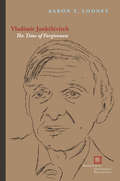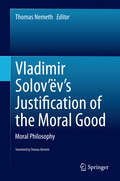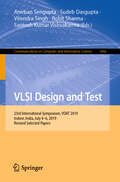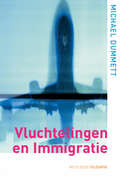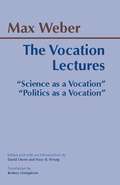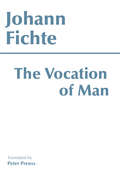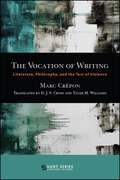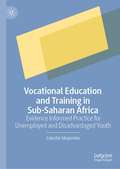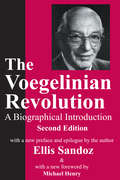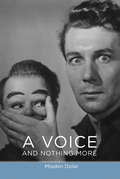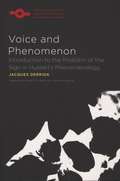- Table View
- List View
Vital Forces, Teleology and Organization: Philosophy of Nature and the Rise of Biology in Germany (History, Philosophy and Theory of the Life Sciences #21)
by Andrea GambarottoThis comprehensive account of vitalism and the German philosophy of nature in the eighteenth century proposes an innovative thesis. The author restates the theories formulated by the G#65533;ttingen School, but also shows that some of its central tenets are drawn directly from the Naturphilosophie developed in Jena. In this sense the Biologie consists substantially of a compilation of theories elaborated in the previous decades, yet Treviranus rearranges them in a unitary framework and interprets them with a peculiar emphasis on the interaction between organism and environment. On the basis of this new approach he was the first naturalist in the German speaking world to sketch the outline of a theory concerned with the historical transformation of living forms. The book begins by considering the problem of generation, focussing on the debate involving Wolff, Blumenbach, Kant and Reil on the notion of "formative force. " Readers are invited to engage with the question of the origin of form and the epistemological status of the Bildungkraft as a principle of organization. The second chapter is concerned with the problem of functions and shows how this debate intersected Haller's theory on the vital properties of nerves and fibers. Readers are shown how Blumenbach and Kielmeyer both understand the animal kingdom as a graded series of organisms characterized by increasing functional complexity. The problem of classification is treated in the third chapter, showing how this model was developed in Goethe's morphology, Schelling's Naturphilosophie and Oken's comparative anatomy. The author explores their common character, which is an understanding of classification based on the idea of a unity of plan connecting all living forms with one another, and that of living nature as a universal organism. Finally, an analysis of the fundamental tenets of Treviranus' Biologie shows how the three instances of the pre-biological discourse on living beings converged as unified disciplinary matrix of a general biology. This overall account and its innovative thesis will be of interest to scholars of classical German philosophy, particularly those researching the philosophy of nature and the history and philosophy of biology.
The Vital Illusion (The Wellek Library Lectures)
by Jean BaudrillardAren't we actually sick of sex, of difference, of emancipation, of culture? With this provocative taunt, the indomitable sociologist Jean Baudrillard challenges us to face up to our deadly, technologically empowered renunciation of mortality and subjectivity as he grapples with the complex issues that define our postmillennial world. What does the advent and proliferation of cloning mean for our sense of ourselves as human beings? What does the turn of the millennium say about our relation to time and history? What does the instantaneous, virtual realm of cyberspace do to reality? In The Vital Illusion—as always—Baudrillard leads his readers to some surprising conclusions.Baudrillard considers how human cloning—as well as the "cloning" of ideas and social identities—heralds an end to sex and death and the divagations of living by instituting a realm of the Same, beyond the struggles of individuation. In this day and age when everything can be cloned, simulated, programmed, and genetically and neurologically managed, humanity shows itself unable to brave its own diversity, preferring instead to regress to the pathological eternity of self-replicating cells. By reverting to our viral origins as sexless immortal beings, we are, ironically, fulfilling a death wish, putting an end to our own species as we know it. Next, Baudrillard explores the "nonevent" that was and is the turn of the millennium. He provocatively puts forward the thesis that the arrival of the year 2000 could never take place because we could neither resolve nor leave behind our history, nor could we stop counting down toward our future. For Baudrillard, the millennial clock reading to the millionth of a second on its way to zero is the perfect symbol of our time: history decays rather than progresses. In closing, Baudrillard examines what he calls "the murder of the real" by the virtual. In a world of copies and clones in which everything can be made present in an instant by technology, we can no longer even speak of reality. Beyond Nietzsche's symbolic murder of God, our virtual world free of referents is in the process of exterminating reality, leaving no trace: "The corps(e) of the Real—if there is any—has not been recovered, is nowhere to be found."Peppered with Baudrillard's signature counterintuitive moves, prophetic visions, and dark humor, The Vital Illusion exposes the contradictions that guide our contemporary culture and rule our lives.
Vital Signs: Nature, Culture, Psychoanalysis
by Charles ShepherdsonFirst published in 2000. Routledge is an imprint of Taylor & Francis, an informa company.
Vital Strife: Sleep, Insomnia, and the Early Modern Ethics of Care
by Benjamin ParrisVital Strife examines the close yet puzzling relationship between sleep and ethical care in early modernity. The plays, poems, and philosophical essays at the heart of this book—by Jasper Heywood, William Shakespeare, Edmund Spenser, John Milton, and Margaret Cavendish—explore the unconscious motions of corporeal life and the drowsy forms of sentience at the boundaries of human thought and intentionality. Benjamin Parris shows how these writers, although trained under the Renaissance humanist paradigm of attentive care, begin to dissolve the humanist coupling of virtue with vigilance by giving credence to the vital power of sleep. In contrast to humanist thinkers who equated sleep with carelessness, these writers draw on the ancient Stoic principle of oikeiôsis—the process of orienting the living being toward its proper objects of care, beginning with itself—in asserting the value of sleep, while underscoring insomnia's threat to the ethical flourishing of persons and polity alike. Parris offers an important revaluation of Stoic philosophy, which has too often been misconstrued as renouncing feeling and sympathetic connection with others. With its striking new account of the reception of Stoicism and attitudes toward sleep and sleeplessness in early modern thought, Vital Strife reveals the period's mounting concern with the regenerative nature of physical life and its elaboration of a newfound ethics of care.
Vitalism and Its Legacy in Twentieth Century Life Sciences and Philosophy (History, Philosophy and Theory of the Life Sciences #29)
by Charles T. Wolfe Christopher DonohueThis Open Access book combines philosophical and historical analysis of various forms of alternatives to mechanism and mechanistic explanation, focusing on the 19th century to the present. It addresses vitalism, organicism and responses to materialism and its relevance to current biological science. In doing so, it promotes dialogue and discussion about the historical and philosophical importance of vitalism and other non-mechanistic conceptions of life. It points towards the integration of genomic science into the broader history of biology. It details a broad engagement with a variety of nineteenth, twentieth and twenty-first century vitalisms and conceptions of life. In addition, it discusses important threads in the history of concepts in the United States and Europe, including charting new reception histories in eastern and south-eastern Europe. While vitalism, organicism and similar epistemologies are often the concern of specialists in the history and philosophy of biology and of historians of ideas, the range of the contributions as well as the geographical and temporal scope of the volume allows for it to appeal to the historian of science and the historian of biology generally.
Vitalism and the Scientific Image in Post-Enlightenment Life Science, 1800-2010
by Sebastian Normandin Charles T. WolfeVitalism is understood as impacting the history of the life sciences, medicine and philosophy, representing an epistemological challenge to the dominance of mechanism over the last 200 years, and partly revived with organicism in early theoretical biology. The contributions in this volume portray the history of vitalism from the end of the Enlightenment to the modern day, suggesting some reassessment of what it means both historically and conceptually. As such it includes a wide range of material, employing both historical and philosophical methodologies, and it is divided fairly evenly between 19th and 20th century historical treatments and more contemporary analysis. This volume presents a significant contribution to the current literature in the history and philosophy of science and the history of medicine.
The Vitality of Contradiction
by Bruce GilbertIn The Vitality of Contradiction, Bruce Gilbert provides an exposition of Hegel's political philosophy to establish not only that societies fail because of their contradictions, but also how the unsurpassable oppositions of social life cultivate freedom. He moves beyond Hegel's works to consider the limits of liberal-capitalism and the contemporary social movements around the world that stretch us beyond the global economic system. Drawing on key Hegel texts such as Phenomenology of Spirit and the Philosophy of Right, Gilbert shows how societies outgrow themselves as they come to recognize key aspects of freedom and justice. He argues that the dialectic requires that we recognize how liberal-capitalism has both cultivated freedom and yet fails to lead us to more sophisticated forms of freedom. Gilbert also highlights organizations including Brazil's Movement of Landless Workers and the Mondragon cooperative in Spain and the sophisticated ways in which they are teaching the world new and better ways to be free. Engaging and perceptive, The Vitality of Contradiction illuminates the basic principles behind Hegel's political thought and indicates the ways in which his work encourages people to strive for a form of socialist democracy.
The Vitality of Contradiction: Hegel, Politics, and the Dialectic of Liberal-Capitalism
by Bruce GilbertIn The Vitality of Contradiction, Bruce Gilbert provides an exposition of Hegel's political philosophy to establish not only that societies fail because of their contradictions, but also how the unsurpassable oppositions of social life cultivate freedom. He moves beyond Hegel's works to consider the limits of liberal-capitalism and the contemporary social movements around the world that stretch us beyond the global economic system. Drawing on key Hegel texts such as Phenomenology of Spirit and the Philosophy of Right, Gilbert shows how societies outgrow themselves as they come to recognize key aspects of freedom and justice. He argues that the dialectic requires that we recognize how liberal-capitalism has both cultivated freedom and yet fails to lead us to more sophisticated forms of freedom. Gilbert also highlights organizations including Brazil's Movement of Landless Workers and the Mondragon cooperative in Spain and the sophisticated ways in which they are teaching the world new and better ways to be free. Engaging and perceptive, The Vitality of Contradiction illuminates the basic principles behind Hegel's political thought and indicates the ways in which his work encourages people to strive for a form of socialist democracy.
Vitalizing Vocabulary: Doing Pedagogy and Language in Early Childhood Education
by Nicole Land Cristina D. VintimillaThinking with language as a complex practice for educators, advocates, and researchers in early childhood education is a necessary gesture for countering the anti-intellectualism that designates early childhood education as a service providing custodial care. Vitalizing Vocabulary insists that early childhood education in Canada must unsettle our inherited demand for technocratic, instrumental, and accessible relations with language. At the collision of research and practice, Nicole Land and Cristina D. Vintimilla propose that cultivating playful, speculative, inventive, accountable, and answerable relations with words, concepts, and language is a critical move toward broadening early childhood education’s intellectual and interdisciplinary horizons. The book is organized into four actions that activate pedagogical grammars: reading, writing, citing, and speaking. Each section plays with the purposes of a glossary by proposing language that we would work to erase, reclaim, and introduce. This situates language as an ethical, political, and creative pedagogical process that puts specific relations, curricula, and subjectivities into motion. Vitalizing Vocabulary ultimately envisions a project of early childhood education where students, educators, pedagogists, researchers, community, and others share a common commitment to creating responsive, meaningful, ethical, and political pedagogies.
Vito Volterra
by Giovanni Paoloni Angelo Guerraggio Kim WilliamsVito Volterra (1860-1940) was one of the most famous representatives of Italian science in his day. Angelo Guerragio and Giovanni Paolini analyze Volterra's most important contributions to mathematics and their applications, as well as his outstanding organizational achievements in scientific policy. Volterra was one of the founding fathers of functional analysis and the author of fundamental contributions in the field of integral equations, elasticity theory and population dynamics (Lotka-Volterra model). He delivered keynote lectures on the occasion of the International Congresses of Mathematicians held in Paris (1900), Rome (1908), Strasbourg (1920) and Bologna (1928). He became involved in the scientific development in united Italy and was appointed senator of the kingdom in 1905. One of his numerous non-mathematical activities was founding the National Research Council (Consiglio Nazionale delle Ricerche, CNR). During the First World War he was active in military research. After the war he took a clear stand against fascism, which was the starting point for his exclusion. In 1926 he resigned as president of the world famous Accademia Nazionale dei Lincei and was later on excluded from the academy. In 1931 he was one of the few university lecturers who denied to swear an oath of allegiance to the fascistic regime. In 1938 he suffered from the impact of the racial laws. The authors draw a comprehensive picture of Vito Volterra, both as a great mathematician and an organizer of science.
Vittorio Benussi in the History of Psychology: New Ideas of a Century Ago (Studies in the History of Philosophy of Mind #21)
by Mauro AntonelliThis book covers the basic guidelines of Vittorio Benussi’s research during the period at Graz and at Padua. It does so in the light of a thorough study of his Nachlass. The book re-evaluates Benussi’s work as a historical piece, and shows how his work is still relevant today, especially in the areas of cognitive psychology and cognitive science. The volume deals with this original and ingenious - though largely ignored - scholar and discusses his work as a leading experimental psychologist. Benussi’s contributions as discussed in this book were particularly relevant in the fields of visual and tactile perception, time perception, forensic psychology, hypnosis and suggestion, unconscious, and emotions. His classical papers are impressive in their originality, energy, range of approaches, experimental skill, the wealth of findings, and the quality of theoretical discussions. This book demonstrates that Benussi was ahead of his time and that his themes, experiments and research programmes are highly relevant to contemporary cognitive psychology.
Viva La Raza: A History of Chicano Identity and Resistance
by Yolanda Alaniz Megan CornishLiterary Nonfiction. Political Science. Latino/Latina Studies. LGBT Studies. A lively and accessible investigation of Mexican American militancy from the U.S. occupation of Northern Mexico in the 19th century to civil rights struggles in the present era. The authors describe monumental labor battles, survey the Raza youth movement, focus attention on the role of women, and examine issues such as police brutality, the emergence of Chicana/o lesbians and gays, and the role of radical organizations, while also exploring hotly debated theories about the source of discrimination against Chicanos. <p><p>VIVA LA RAZA reveals the workings of race and nationality in the United States in relation to people of Mexican ancestry, a group that is too little understood though its members comprise this country's second largest population of people of color.
Viva Voce: Conversations with Italian Philosophers (SUNY series in Contemporary Italian Philosophy)
by Silvia BensoThrough conversations with twenty-three leading Italian philosophers representing a variety of scholarly concerns and methodologies, this volume offers an informal overview of the background, breadth, and distinctiveness of contemporary Italian philosophy as a tradition. The conversations begin with general questions addressing issues of provenance, domestic and foreign influences, and lineages. Next, each scholar discusses the main tenets, theoretical originality, and timeliness of their work. The interviews conclude with thoughts about what directions each philosopher sees the discipline heading in the future. Every conversation is a testimony to the differences that characterize each thinker as unique and that invigorate the Italian philosophical landscape as a whole. The individual replies differ widely in tone, focus, and style. What emerges is a broad, deep, lively, and even witty picture of the Italian philosophical landscape in the voices of its protagonists.
Viviendo bajos tus propios términos
by Osho¿Cuál es la verdadera rebelión? En Viviendo bajo tus propios términos, Osho nos revela cómo podemos oponernos a las normas contrarias a nuestros valores con el fin de preservar nuestra individualidad. Décadas después de las rebeliones de los años sesenta, estamos desafiando de nuevo estructuras y valores del pasado, sobre todo los relacionados con sistemas políticos y económicos obsoletos. Tenemos la oportunidad y responsabilidad de ampliar el concepto de libertad humana. En este contexto, la visión del gran maestro del siglo xx nos ayudará a promover nuevos sistemas para el bien de la humanidad. «La gente sólo puede ser feliz de una manera: siendo auténtica. Así las fuentes de su felicidad empiezan a fluir y se vuelven más vivos, es una alegría verlos, estar con ellos. Son una canción, un baile.» Osho
Vladimir Jankélévitch: The Time of Forgiveness (Perspectives in Continental Philosophy)
by Aaron T. LooneyVladimir Jankélévitch: The Time of Forgiveness traces the reflections of the French philosopher and musicologist Vladimir Jankelevitch on the conditions and temporality of forgiveness in relation to creation, history, and memory. The author demonstrates the influence of Jewish and Christian thought on Jankelevitch’s philosophy and compares his ideas about the gift character of forgiveness, the role of retributive emotions in conceptions of justice, and the limits of reason with those of Aristotle, Butler, Kant, Kierkegaard, Nietzsche, Scheler, Arendt, Derrida, Levinas, and Ricoeur.The Shoah was the pivotal historical event in Jankelevitch’s life. As this book shows, Jankelevitch’s question “Is forgiveness possible as a response to evil?” remains a potent philosophical conundrum today. Paradoxically, for Jankelevitch, evil is both the impetus and the obstacle to forgiveness.
Vladimir Solov'ëv's Justification of the Moral Good
by Thomas NemethThis new English translation of Solov'ëv's principal ethical treatise, written in his later years, presents Solov'ëv's mature views on a host of topics ranging from a critique of individualistic ethical systems to the death penalty, the meaning of war, animal rights, and environmentalism. Written for the educated public rather than for a narrow circle of specialists, Solov'ëv's work largely avoids technical vocabulary while illustrating his points with references to classical literature from the ancient Greeks to Goethe. Although written from a deeply held Christian viewpoint, Solov'ëv emphasizes the turn from his earlier position, now allegedly developing the independence of moral philosophy from metaphysics and revealed religion. Solov'ëv sees the formal universality of the idea of the moral good in all human beings, albeit that this idea is bereft of material content. This first new English-language translation in a century makes a unique contribution to the study of Solov'ëv's thought. It uses the text of the second edition published in 1899 as its main text, but provides the variations and additions from the earlier versions of each chapter in running notes. Other unique features of this translation are that the pagination of the widely available 1914 edition is provided in the text, and the sources of Solov'ëv's numerous Biblical quotations and references as well as literary and historical allusions.
VLSI Design and Test: 23rd International Symposium, VDAT 2019, Indore, India, July 4–6, 2019, Revised Selected Papers (Communications in Computer and Information Science #1066)
by Rohit Sharma Virendra Singh Sudeb Dasgupta Anirban Sengupta Santosh Kumar VishvakarmaThis book constitutes the refereed proceedings of the 23st International Symposium on VLSI Design and Test, VDAT 2019, held in Indore, India, in July 2019. The 63 full papers were carefully reviewed and selected from 199 submissions. The papers are organized in topical sections named: analog and mixed signal design; computing architecture and security; hardware design and optimization; low power VLSI and memory design; device modelling; and hardware implementation.
Vluchtelingen en immigratie (Routledge filosofie)
by Sir Michael DummettMichael Dummett, eminent filosoof en scherpzinnig maatschappijcriticus, pleit al vele jaren voor een eerlijke behandeling van immigranten en vluchtelingen in Europa. In dit inzichtelijke boek heeft hij voor de eerste keer al zijn gedachten over deze belangrijke kwestie gebundeld.Na een eerste verkenning van de verwarde en vaak zeer onrechtvaardige opvattingen over immigratie, onderwerpt Dummett de principes en rechtvaardigingen van het desbetreffende overheidsbeleid aan een nauwkeurig onderzoek, waarbij hij erop wijst dat dit beleid vaak in strijd is met de rechten van vluchtelingen zoals die in het Verdrag van Genève zijn neergelegd. Aan de hand van confronterende en vaak aangrijpende voorbeelden wijst Vluchtelingen en immigratie de weg naar een nieuwe, meer menswaardige benadering van een probleem dat wij niet mogen negeren.
The Vocation Lectures
by Max Weber Rodney Livingstone Tracy B. Strong David OwenOriginally published separately, Weber's Science as a Vocation and Politics as a Vocation stand as the classic formulations of his positions on two related subjects that go to the heart of his thought: the nature and status of science and its claims to authority; and the nature and status of political claims and the ultimate justification for such claims. Together in this volume, these newly translated lectures offer an ideal point of entry into Weber's central project: understanding how, as Weber put it, "in the West alone there have appeared cultural manifestations [that seem to] go in the direction of universal significance and validity.
The Vocation of Man
by Johann Gottlieb Fichte Peter PreussContents:Translator's Introduction Selected Bibliography Note on the TextThe Vocation of ManPreface Book One: Doubt Book Two: Knowledge Book Three: Faith
The Vocation of Writing: Literature, Philosophy, and the Test of Violence (SUNY series, Literature . . . in Theory)
by Marc CréponWithin the violence our societies must confront today exists a dimension proper to language. Anyone who has been through the educational system, for example, recognizes how language not only shapes and models us, but also imposes itself upon us. During the twentieth century, this system revealed how language can condemn one to a certain death. In The Vocation of Writing, philosopher Marc Crépon explores this dimension of language, convinced that the node of all violence pertains first to language and how we make use of it. Crépon focuses on Kafka, Levinas, Singer, and Derrida, not only because each rose against commandeering language in order to warn against the next massacres, but also because their work affirms the vocation of writing—that which makes literature and philosophy the final weapon for unmasking the violence and hatred that language bears at its heart. To affirm the vocation of writing is to turn language against itself, to defuse its murderous potentialities by opening it toward exchange, responsibility, and humanity when the latter fixes the other and the world as its goals.
Vocational Education and Training in Sub-Saharan Africa: Evidence Informed Practice for Unemployed and Disadvantaged Youth
by Celestin MayombeThis book analyses the accessibility and success of vocational training programmes for unemployed and disadvantaged youth in Sub-Saharan Africa. Examining the implementation of vocational education and training programmes, the author assesses various internal and external enabling factors that can help foster youth employment. In doing so, the author presents a solid base for robust and evidence-informed practice and policy making for vocational training programmes, analysing such themes as employability skills, the labour market, and work-integrated learning. It also emphasises the importance of stakeholders taking into account the enabling and disabling environments found in a given local, regional or national context. It will be of interest to scholars of vocational training programmes in Sub-Saharan Africa and elsewhere, as well as of youth poverty and unemployment.
The Voegelinian Revolution: A Biographical Introduction
by Lynda Lytle HolmstromOver the past half-century, Eric Voegelin has produced a demanding body of writing on the philosophy of history and the history of political theory since antiquity. This is the first full-scale treatment of his inquiry into the reality of man's political existence. It includes close readings of the texts, with Voegelin's own comments on them interspersed, offering a thorough explication of the philosopher's quest.Incorporating an "Autobiographical Memoir" prepared in collaboration with Voegelin especially for the volume, Ellis Sandoz interweaves the events of this great thinker's life with the philosophical inquiry to which that life has been devoted. Among the uniquely engaging biographical subjects covered are Voegelin's reminiscences of his involvement with such seminal minds as Max Weber, and with Karl Kraus, Hans Kelsen, and other lights of Vienna's intellectual community of the 1920s and 1930s; a full discussion of his early responses to national socialism and his escape from the Anschluss in 1938; and a summary of his early years in America, with particular attention to the years at Louisiana State University with Cleanth Brooks, Robert Penn Warren, and Robert Heilman.Carefully analyzing Voegelin's contribution to our understanding of ourselves, Sandoz convincingly argues that Voegelin's achievement is revolutionary. He emphasizes the common sense running through Voegelin's thought, and reveals how Voegelin reached a new analysis of reality and provides us with a new science of human affairs. Sandoz does not reveal the "truth to end the quest for truth," but shows how such "stop history" answers are defective. Exploring the meaning of that "first truth" as it has been intellectually and spiritually unraveled by one of our century's leading thinkers, Voegelinian Revolution shows anyone interested in politics and human affairs how to follow Voegelin's path. This book will be of interest to historians, political theorists, students of philosophy and religion, and educated readers concerned about the plight of American/Western civilization and looking for a new view on our current "crisis."
A Voice and Nothing More (Short Circuits)
by Mladen DolarA new, philosophically grounded theory of the voice—the voice as the lever of thought, as one of the paramount embodiments of the psychoanalytic object.Plutarch tells the story of a man who plucked a nightingale and finding but little to eat exclaimed: "You are just a voice and nothing more." Plucking the feathers of meaning that cover the voice, dismantling the body from which the voice seems to emanate, resisting the Sirens' song of fascination with the voice, concentrating on "the voice and nothing more": this is the difficult task that philosopher Mladen Dolar relentlessly pursues in this seminal work.The voice did not figure as a major philosophical topic until the 1960s, when Derrida and Lacan separately proposed it as a central theoretical concern. In A Voice and Nothing More Dolar goes beyond Derrida's idea of "phonocentrism" and revives and develops Lacan's claim that the voice is one of the paramount embodiments of the psychoanalytic object (objet a). Dolar proposes that, apart from the two commonly understood uses of the voice as a vehicle of meaning and as a source of aesthetic admiration, there is a third level of understanding: the voice as an object that can be seen as the lever of thought. He investigates the object voice on a number of different levels—the linguistics of the voice, the metaphysics of the voice, the ethics of the voice (with the voice of conscience), the paradoxical relation between the voice and the body, the politics of the voice—and he scrutinizes the uses of the voice in Freud and Kafka. With this foundational work, Dolar gives us a philosophically grounded theory of the voice as a Lacanian object-cause.
Voice and Phenomenon: Introduction to the Problem of the Sign in Husserl's Phenomenology
by Jacques Derrida Leonard LawlorPublished in 1967, when Derrida is 37 years old, Voice and Phenomenon appears at the same moment as Of Grammatology and Writing and Difference. All three books announce the new philosophical project called "deconstruction. " Although Derrida will later regret the fate of the term "deconstruction," he will use it throughout his career to define his own thinking. While Writing and Difference collects essays written over a 10 year period on diverse figures and topics, and Of Grammatology aims its deconstruction at "the age of Rousseau," Voice and Phenomenon shows deconstruction engaged with the most important philosophical movement of the last hundred years: phenomenology. Only in relation to phenomenology is it possible to measure the importance of deconstruction. Only in relation to Husserl's philosophy is it possible to understand the novelty of Derrida's thinking. Voice and Phenomenon therefore may be the best introduction to Derrida's thought in general. To adapt Derrida's comment on Husserl's Logical Investigations, it contains "the germinal structure" of Derrida's entire thought. Lawlor's fresh translation of Voice and Phenomenon brings new life to Derrida's most seminal work.
